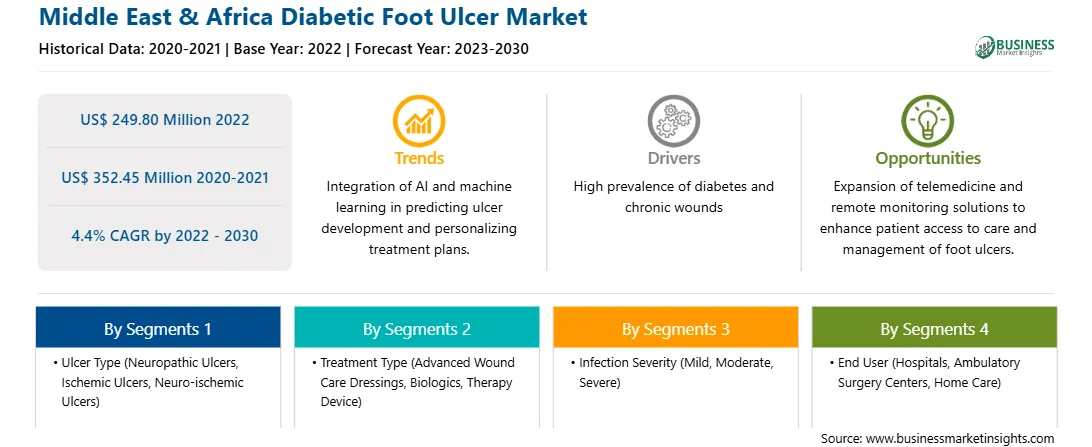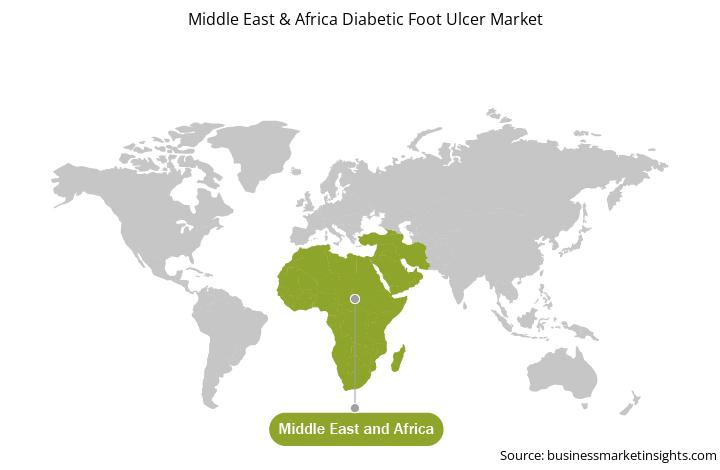Diabetic patients are vulnerable to wounds, and the healing process is usually longer. Depending on healing timeframe, wounds are classified as acute and chronic. Diabetes is a life-threatening chronic disease with no functional cure. Diabetes can lead to various complications in different body parts and increase the overall risk of premature death. According to the International Diabetes Federation (IDF), in 2021, there were ∼537 million adults living with diabetes worldwide. The number is anticipated to increase to 643 million by 2030 and 783 million by 2045. Blood vessels and nerves in the feet of diabetic patients are prone to damages, resulting in numbness. Due to this, diabetic patients have a higher chance of developing diabetic foot ulceration.
According to a study published in 2021 in National Center for Biotechnology Information (NCBI), the risk of developing diabetic foot ulcers is between 19% and 34%. Approximately, a recurrence rate of 40% is experienced by patients within 1 year of recovery, 60% within 3 years, and 65% within 5 years. As per same study, it is reported that infection develops in 50–60% of ulcers and is the principal cause that damages diabetic feet. Thus, the demand for diabetic foot ulcer treatments is on rise globally, thereby fueling the market growth.
The Middle East & Africa diabetic foot ulcer market is estimated to grow at a CAGR of 6.4% from 2022 to 2030. Key factors driving the market growth are increasing prevalence of diabetes and related chronic wounds and the rise in geriatric population propel market growth. However, high cost of advanced wound care treatments hinders the market growth. In the last few years, the private sector has been playing an important role in the healthcare system in Saudi Arabia, owing to the rising investments in the development of healthcare facilities and infrastructure in the country. The Government of Saudi Arabia launched the Saudi Vision 2030 program to reduce oil dependence and diversify other sectors, including healthcare. Under this program, the Health Sector Transformation Program aims to reconstruct the healthcare sector as a comprehensive, effective, and integrated health system based on the health of individuals. Thus, the increasing investments in developing healthcare facilities and the increasing prevalence of diabetes among the population will fuel the market growth in the Middle East & Africa.
Based on treatment type, the Middle East & Africa diabetic foot ulcer market is segmented into advanced wound care dressings, therapy device, and biologics. The advanced wound care dressings segment held the largest share in 2022.
Based on ulcer type, the Middle East & Africa diabetic foot ulcer market is segmented into neuro-lschemic ulcers, neuropathic ulcers, and ischemic ulcers. The neuro-lschemic ulcers segment held the largest share in 2022.
Based on infection severity, the Middle East & Africa diabetic foot ulcer market is segmented into mild, moderate, and severe. The mild segment held the largest share in 2022.
Based on end user, the Middle East & Africa diabetic foot ulcer market is segmented into hospitals, ambulatory surgical centers, and home care. The hospitals segment held largest share in 2022.
Based on country, the Middle East & Africa diabetic foot ulcer market is segmented into South Africa, Saudi Arabia, UAE, and the Rest of MEA. South Africa dominated the Middle East & Africa diabetic foot ulcer market in 2022.
Convatec Group Plc, 3M Co, Coloplast AS, Smith & Nephew Plc, B. Braun SE, Medline Industries LP, Organogenesis Inc., Mölnlycke Health Care AB, and MiMedx Group Inc are some of the leading companies operating in the Middle East & Africa diabetic foot ulcer market.
Strategic insights for the Middle East & Africa Diabetic Foot Ulcer provides data-driven analysis of the industry landscape, including current trends, key players, and regional nuances. These insights offer actionable recommendations, enabling readers to differentiate themselves from competitors by identifying untapped segments or developing unique value propositions. Leveraging data analytics, these insights help industry players anticipate the market shifts, whether investors, manufacturers, or other stakeholders. A future-oriented perspective is essential, helping stakeholders anticipate market shifts and position themselves for long-term success in this dynamic region. Ultimately, effective strategic insights empower readers to make informed decisions that drive profitability and achieve their business objectives within the market.

| Report Attribute | Details |
|---|---|
| Market size in 2022 | US$ 249.80 Million |
| Market Size by 2030 | US$ 352.45 Million |
| Global CAGR (2022 - 2030) | 4.4% |
| Historical Data | 2020-2021 |
| Forecast period | 2023-2030 |
| Segments Covered |
By Ulcer Type
|
| Regions and Countries Covered | Middle East and Africa
|
| Market leaders and key company profiles |
The geographic scope of the Middle East & Africa Diabetic Foot Ulcer refers to the specific areas in which a business operates and competes. Understanding local distinctions, such as diverse consumer preferences (e.g., demand for specific plug types or battery backup durations), varying economic conditions, and regulatory environments, is crucial for tailoring strategies to specific markets. Businesses can expand their reach by identifying underserved areas or adapting their offerings to meet local demands. A clear market focus allows for more effective resource allocation, targeted marketing campaigns, and better positioning against local competitors, ultimately driving growth in those targeted areas.

1. Convatec Group Plc
2. 3M Co
3. Coloplast AS
4. Smith & Nephew Plc
5. B. Braun SE
6. Medline Industries LP
7. Organogenesis Inc.
8. Mölnlycke Health Care AB
9. MiMedx Group Inc
The Middle East & Africa Diabetic Foot Ulcer Market is valued at US$ 249.80 Million in 2022, it is projected to reach US$ 352.45 Million by 2030.
As per our report Middle East & Africa Diabetic Foot Ulcer Market, the market size is valued at US$ 249.80 Million in 2022, projecting it to reach US$ 352.45 Million by 2030. This translates to a CAGR of approximately 4.4% during the forecast period.
The Middle East & Africa Diabetic Foot Ulcer Market report typically cover these key segments-
The historic period, base year, and forecast period can vary slightly depending on the specific market research report. However, for the Middle East & Africa Diabetic Foot Ulcer Market report:
The Middle East & Africa Diabetic Foot Ulcer Market is populated by several key players, each contributing to its growth and innovation. Some of the major players include:
The Middle East & Africa Diabetic Foot Ulcer Market report is valuable for diverse stakeholders, including:
Essentially, anyone involved in or considering involvement in the Middle East & Africa Diabetic Foot Ulcer Market value chain can benefit from the information contained in a comprehensive market report.